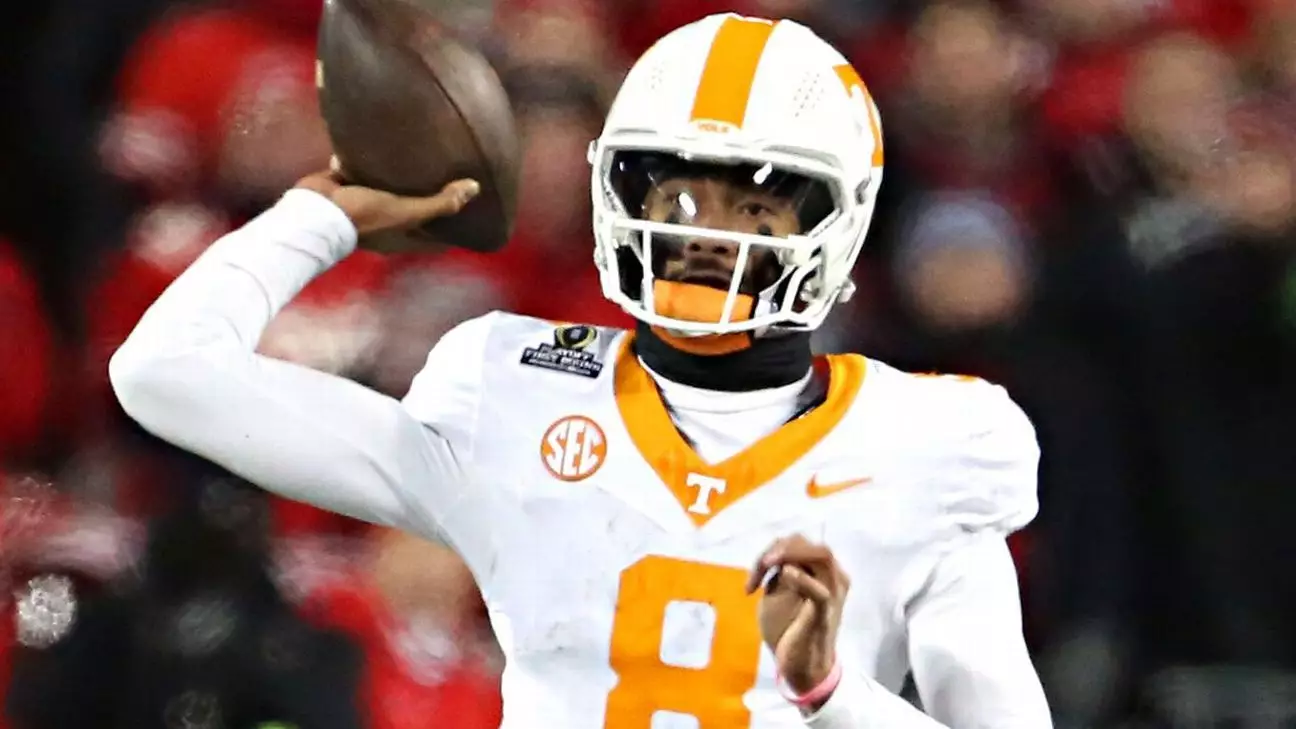The college football landscape is often a swirling tempest of decisions, transfers, and aspirations, where even the slightest movement can send shockwaves across programs. Nico Iamaleava’s potential transfer from Tennessee to UCLA has sparked significant intrigue, reflecting not only personal ambitions but also institutional goals in this high-stakes arena. A highly coveted quarterback, Iamaleava’s decision doesn’t merely hinge on athletic potential; it encapsulates the fiscal realities of modern college sports and the desperation for upward mobility.
The communication between UCLA’s coaching staff and their current roster of quarterbacks suggests that Iamaleava’s impending decision is as much a tactical maneuver as it is about choice; it underscores the competition that shapes college athletics today. While one could argue that it’s a positive development for the Bruins, the uneven financial battleground raises critical questions about the viability and integrity of college sports.
Financial Entanglements and the Price of Talent
The intriguing twist in Iamaleava’s recruitment narrative lies in the financial demands associated with his transfer. Sources indicate that the young quarterback found himself at an intersection of expectations, hoping for a $4 million compensation package from Tennessee, a figure UCLA reportedly could not match. However, when these figures come into play, they transcend mere statistics; they speak volumes about the commercialization of college sports, where values seem increasingly dictated by contract negotiations rather than athletic merit.
Iamaleava, once heralded as a beacon of local talent who led Tennessee to the College Football Playoff, now faces the very real challenges of navigating an uneven financial landscape. The revelation that he was under a contract with Spyre Sports Group worth potentially $10 million over four years raises eyebrows about the shadowy realms of college recruitment. This offers an illustration of how talent equates to cold hard cash, leading to an inevitable collision of ethics and athletics.
The Coaching Crossroads: DeShaun Foster’s Gamble
For UCLA’s head coach, DeShaun Foster, bringing Iamaleava into the fold could act as a pivotal moment in his tenure. Following a disappointing inaugural season, Foster’s ambitions are intertwined with Iamaleava’s commitment. If the quarterback, regarded as the top player in the transfer portal according to ESPN, succeeds, he could redefine the trajectory of the Bruins’ football program. Yet, the burden of expectation weighs heavily.
Foster must embrace both risk and opportunity. Drafting a player like Iamaleava requires keen judgment and, frankly, an insatiable hunger for success. But it also means risking current players’ morale. The announcement of potential recruitment can sow distrust among existing quarterbacks, potentially creating fractures within the team environment. If Foster’s plan is to rejuvenate UCLA’s failing football fortunes, does he risk burning bridges within his locker room in order to do so? An investment in Iamaleava could yield immense returns, but it demands a balanced approach that maintains morale while pursuing a higher ambition.
Family Ties and Familiarity with UCLA
The relational dynamics at play cannot be dismissed. Iamaleava’s earlier recruitment by UCLA, coupled with his familial connection through his younger brother, Madden, hints at a deeper layer of narrative complexity. This historical relationship sets a precedent for quick negotiations and builds familiarity—the bedrock of recruitment in collegiate sports. After all, it’s often that personal connection that can sway a young athlete in a decision steeped in multi-million-dollar implications.
However, the swirling circumstances, including Madden Iamaleava’s last-minute commitment to Arkansas, likely complicate the narrative. The unpredictability of such familial decisions brings to light larger questions about the pressures that high-profile athletes face and whether they can ever escape their trajectories. Can Nico chart a future that not only lives up to his billing but also distance himself from the looming shadows of expectations wrought by family ties?
Future Implications for UCLA Football
Regardless of the outcome, the implications surrounding Nico Iamaleava’s potential transfer resonate well beyond a single player. If he chooses UCLA, it symbolizes an ambitious push from a program seeking to solidify its identity within the ever-intensifying confines of college football. Conversely, if he opts to shun the Bruins, the ramifications could send ripples through the fabric of college athletics, further illuminating the gap between aspirational families and the harsh realities of institutional economics.
The excitement surrounding this recruitment saga exemplifies a transformative moment—for Iamaleava, UCLA, and the college football landscape as a whole. Amidst lofty expectations, fiscal negotiations, and familial pressures, the final decision would not only shape one player’s career but also the future of an entire program significantly behind the curve in a fiercely competitive arena.


Leave a Reply